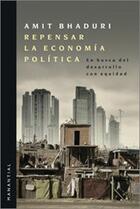With the crisis that erupted late in advanced economies in 2008, fell consensus on many ideas, analysis and economic policies that seemed to have no rivals in the scope of government policies. The earlier orthodox economic policy countries had to resort to intervention measures often criticized. Millions nationalization of leading banks in the world, bailouts of leading companies, injection of funds in the form of monetary issue bonds or zero rates. In this context it is important to know the work of a renowned development economist who has maintained a constant critique of orthodox positions. This book contains eight essays, written over many years of research, which share a central concern: to determine the suitable policies for developing countries to grow while increasing the living standards of their populations, integrating in productive work. For that examines different approac...read more
All book titles by this author
|
Title |
Price | ||
|---|---|---|---|
|
|
Repensar la economía política Publisher: Manantial Collection: Manantial: Reflexiones |
$555.00
20%$444.00 |
Shopping cart
Loading cart
Important notices
|
|
Revista Filosofía & Co. nº 9 Nueva revista de filosofia divulgativa y actualidad |
|
|
"Espacios de la filosofía" - Mauricio Beuchot - Novedad Herder México |
|
|
Revista Filosofía & Co. nº 8 Nueva revista de filosofia divulgativa y actualidad |
|
|
Diván paisaje adentro Novedad Herder México |
|
|
Hechos de tiempo Novedad Herder |
Pay safely with:


In the webshop
New
|
|
Casa de las muñecas 67461 $280.00 -0.00% $280.00 |
|
|
Aliens y anorexia 68036 $390.00 -0.00% $390.00 |
|
|
Potencia de la dulzura 61957 $390.00 -0.00% $390.00 |
|
|
Elogio del riesgo 61955 $430.00 -0.00% $430.00 |
|
|
Vaquera invertida 63356 $430.00 -0.00% $430.00 |
In the press
Promotions
|
|
Panorama B1.2 Curso 46507 $235.00 -35.00% $152.75 |
|
|
Panorama B1 Ejercicios 47046 $475.00 -35.00% $308.75 |
|
|
Panorama A1 Ejercicios. Ubungsbuch 39886 $395.00 -37.00% $248.85 |
|
|
La retórica del Romanticismo 67816 $1,070.00 -35.00% $695.50 |
|
|
La invención del racismo 67822 $580.00 -35.00% $377.00 |




